Unit 2 It must belong to Carla Sectioan A
文档属性
| 名称 | Unit 2 It must belong to Carla Sectioan A | 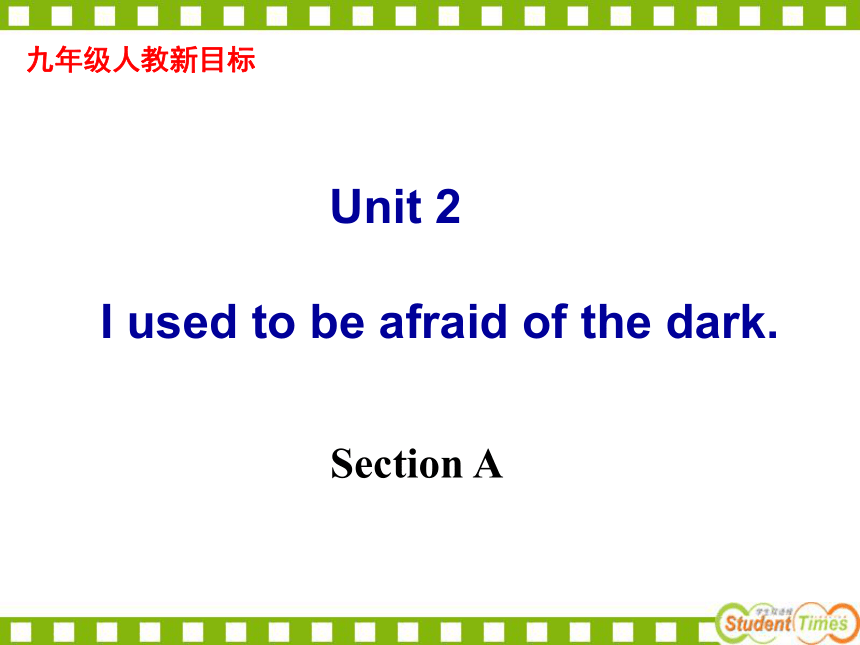 | |
| 格式 | rar | ||
| 文件大小 | 4.9MB | ||
| 资源类型 | 教案 | ||
| 版本资源 | 鲁教版(五四学制) | ||
| 科目 | 英语 | ||
| 更新时间 | 2011-09-13 22:07:50 | ||
图片预览

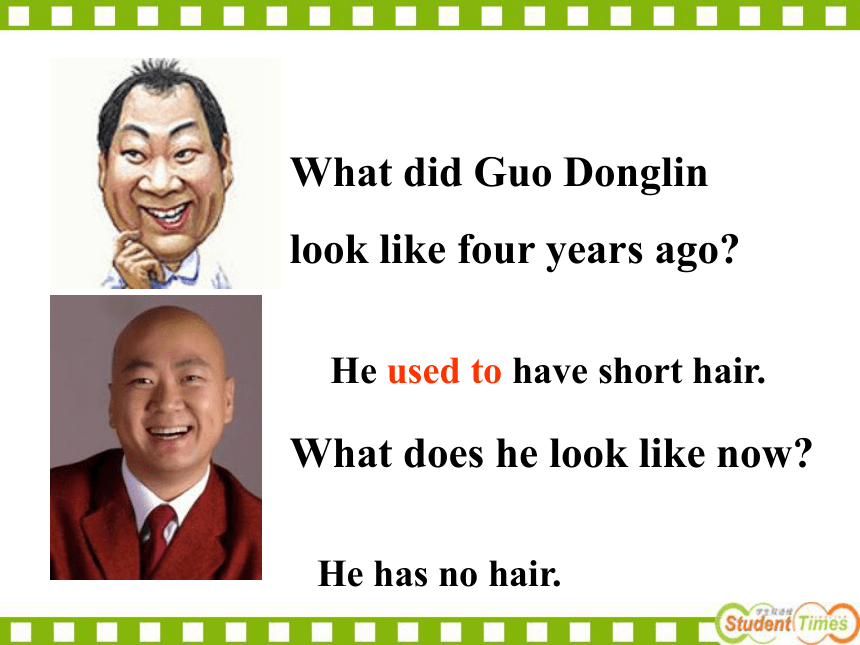
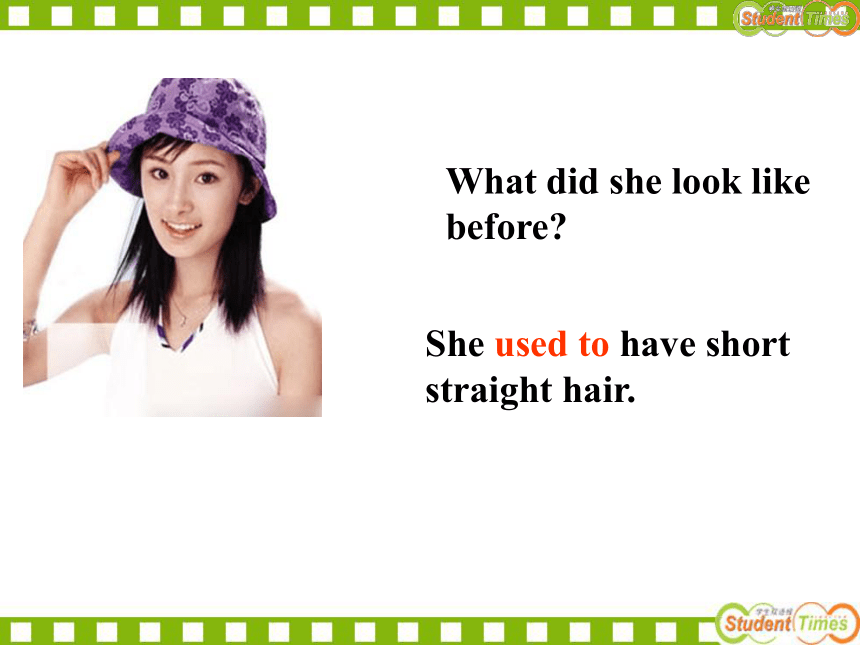
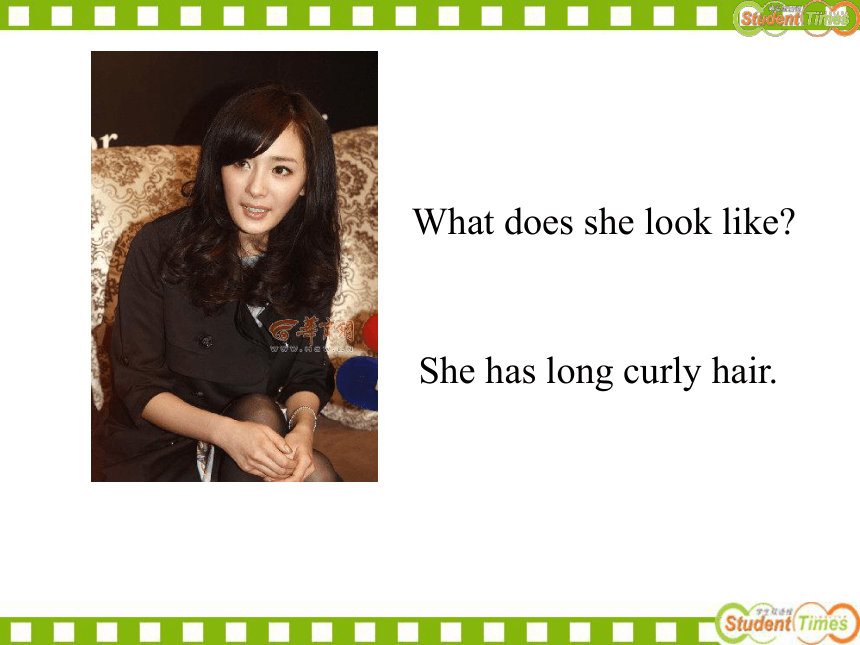
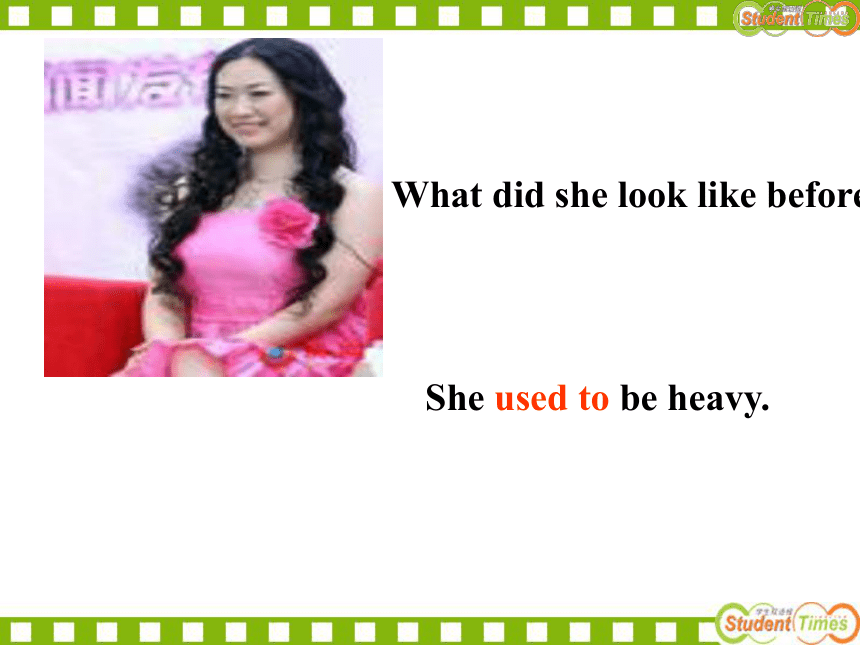
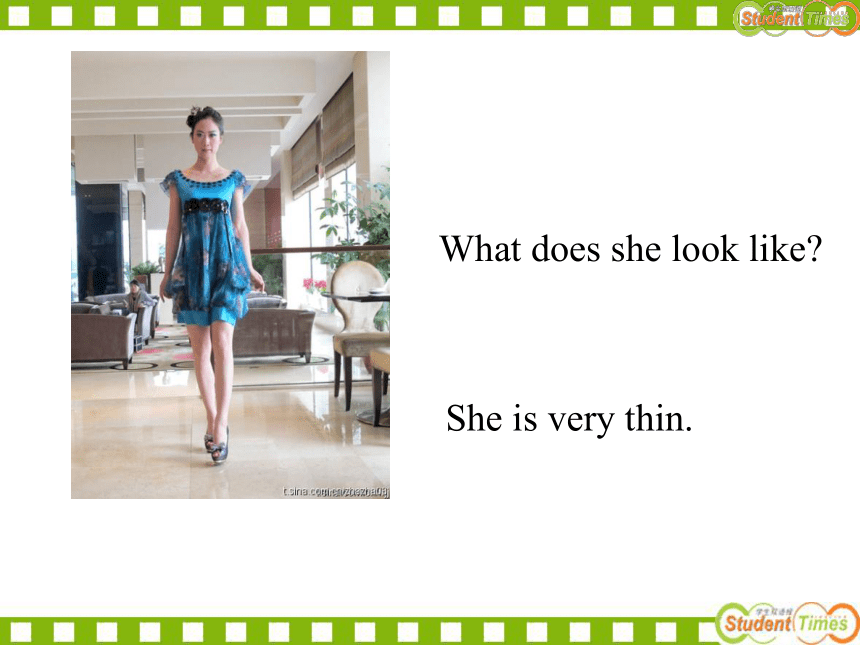
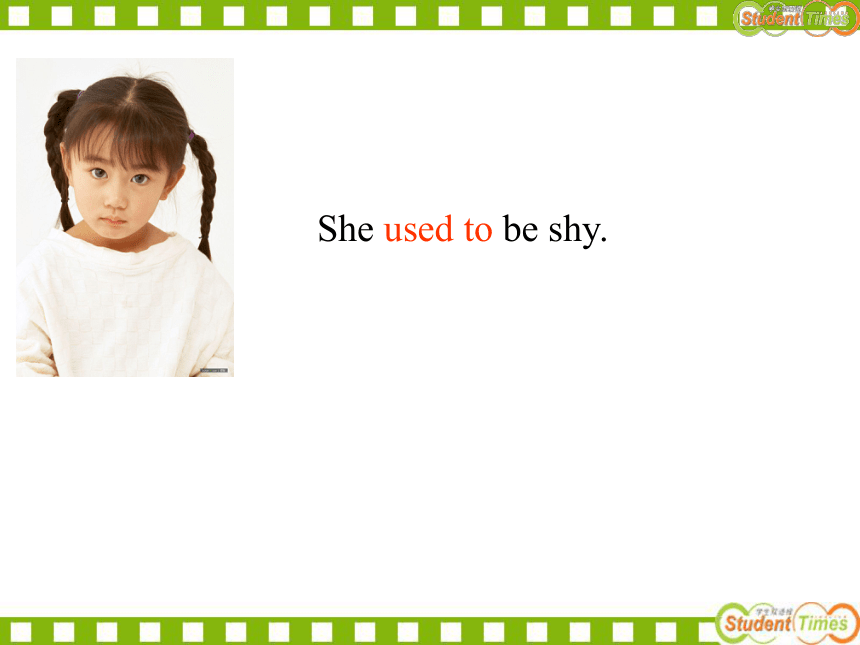
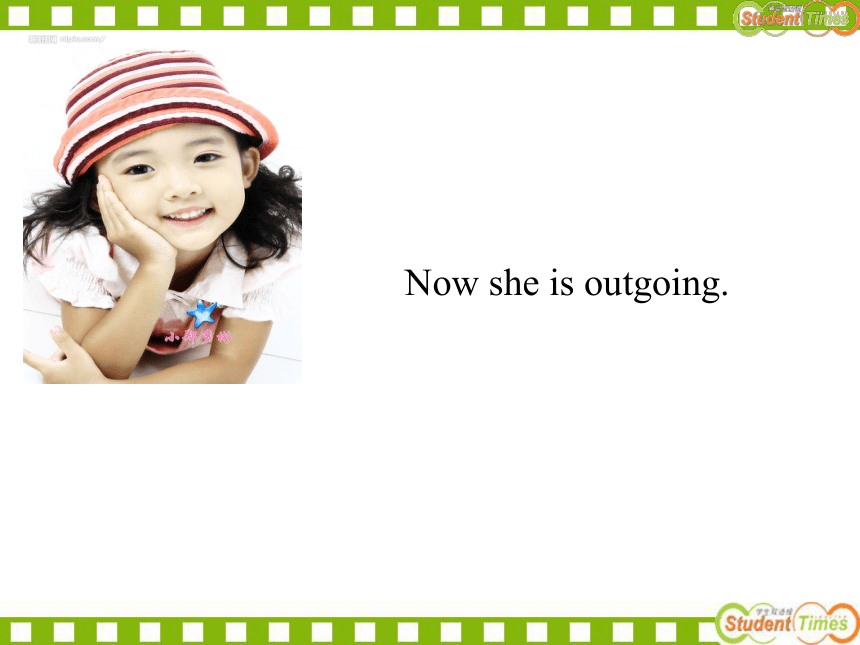
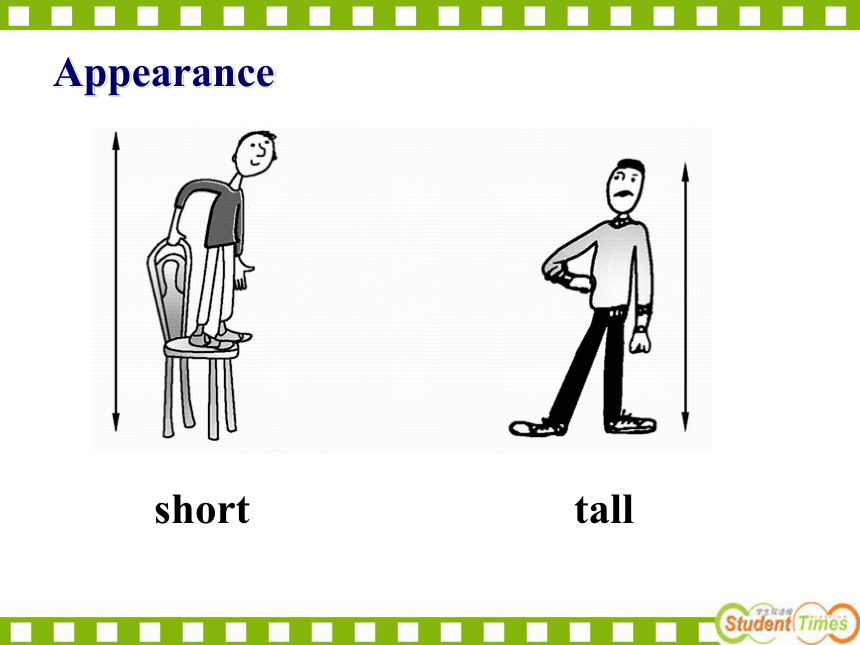
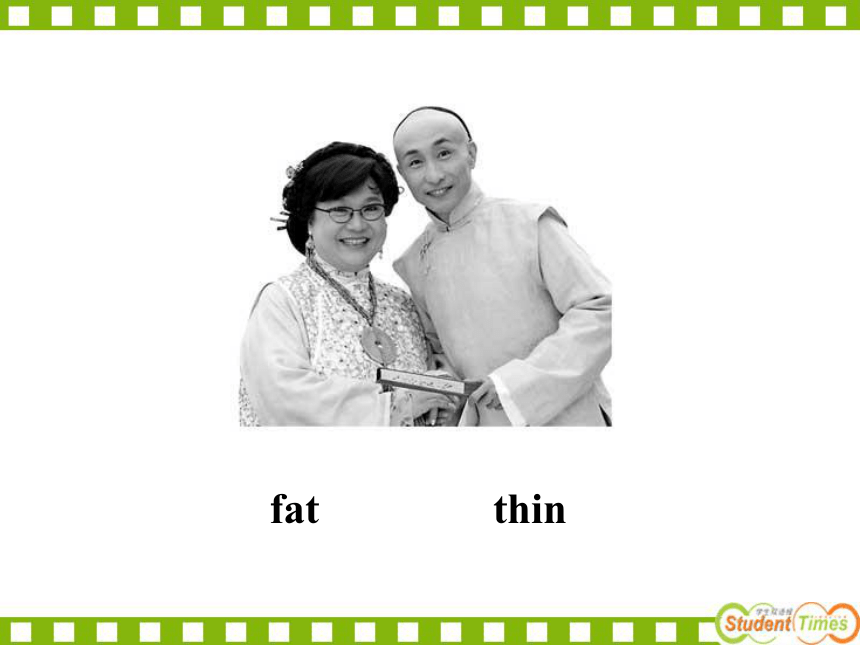
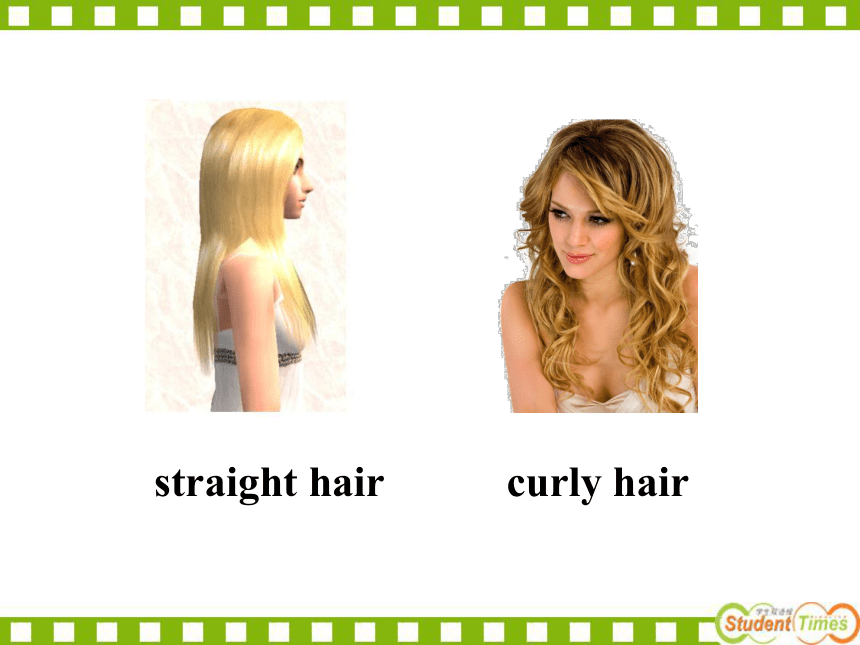
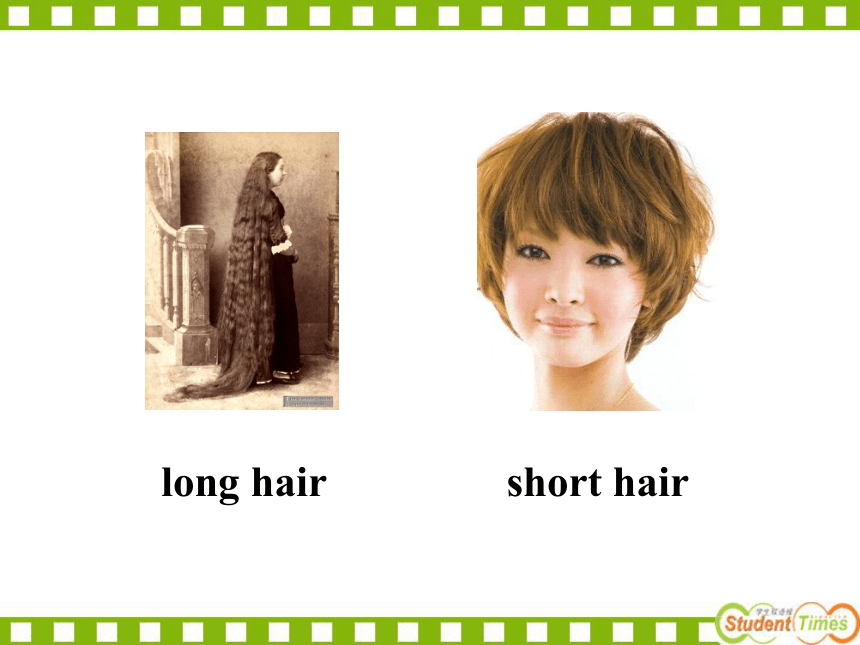
文档简介
(共53张PPT)
九年级人教新目标
Unit 2
Section A
I used to be afraid of the dark.
What did Guo Donglin look like four years ago
What does he look like now
He used to have short hair.
He has no hair.
She used to have short straight hair.
What did she look like before
What does she look like
She has long curly hair.
What did she look like before
She used to be heavy.
What does she look like
She is very thin.
She used to be shy.
Now she is outgoing.
Appearance
short
tall
fat
thin
straight hair
curly hair
long hair
short hair
Personality
shy
outgoing
funny
serious
friendly
quiet
Appearance
(外貌) Personality
(性格)
tall outgoing
straight hair funny
beautiful angry
black careful
dirty happy
hungry hard-working
sad strange
tired noisy
1. “used to+不定式”表示过去常常干某事, 现在不再干了。
eg.
I used to go to work by bus. Now I take a taxi.
She used to be very shy.
He usedn’t / didn’t use / used not to smoke. 他过去不抽烟。
He used to live here, didn’t / usedn’t he 他过去住在这里,不是吗?
在本册书的Unit 12 我们将会学到be (get) used to
be used to中的to是个介词,和used to不同。该词组的含义是“习惯于……”。所以to后面不能接动词原形,而要接名词或v-ing形式。
例如:
They are used to the hard work here now.
他们现在习惯于这里的艰苦工作了。
I’m used to dealing with matters of this kind.
我习惯于处理这类事情。
I used to be afraid of the dark.
我过去怕黑.
“used to +动词原形”表过去的习惯或过去 经常反复发生的动作或状态(现在已经不再存在)
有一种形式,即过去式,用于所有人称.否定形式为used not to+do ,疑问形式为Used you to… Used he to …
例如: I used to be short .
He used to like playing games.
Notes:
但日常口语中常用助动词did,例如:
You used to be short. Did you use to be short He used to play tennis.
Did he use to play tennis
2.You used to be quiet, didn’t you
你以前很静的,是不是
反意疑问句: 陈述句, 动词+主语 肯定/否定 否定/肯定
练习: He is a student, _______________
He isn’t a student,______________
He likes basketball, _____________
They’ll go to Shiqi tomorrow, __________
Your mother can’t swim ,____________
Tom has had his supper,___________
Li Ping is playing football,_____________
He went to school yesterday, _________
1b Listen. What did Bob’s friends use
to look like
Mario used to be ______. He used to wear _______ .
2. Amy used to be______ . She used to have __________.
3. Tina used to have ____ and _____hair.
short
glasses
tall
short hair
red
curly
Conversation 1
Bob: Mario, is that you
Mario: Yeah, it is. It’s Bob! Hey, guys,
it’s Bob! I haven’t seen you for
four years!
Bob: Yeah. I’m here with my parents.
We were visiting for couple of
days. Wow, Mario, you look
different ! You used to be short,
didn’t you
Mario: Yes, I did. Now I’m tall. And so
are you!
Bob: That’s true…And you used to
wear glasses.
Mario: you have a great memory. Now
I wear contact lenses!
Conversation 2
Bob: Hey, Amy, It’s great to see you.
Amy: Hi, Bob. How are you
Bob: Fine. Wow, you’ve changed!
Amy: Really How
Bob: Well, you used to have short hair.
Amy: You remember that Yes, I did.
Bob: And you used to be really tall!
Amy: Not any more. You are taller
than me now, Bob.
Conversation 3
Tina: Hiya, Bob.
Bob: Hi, Tina. You’ve changed too.
Tina: Oh, yeah
Bob: You have blond hair!
Tina: Yeah, it used to be red, didn’t it
Bob: And it’s straight!
Tina: It used to be curly.
1c Pairwork
Make conversation with your partner.
Example
A: Mario used to be short.
B: Yes, he did. Now he’s tall!
2a Listen and check the words you hear.
shy serious
friendly funny
outgoing quiet
2b Listen again and fill in the blanks
with the words you hear.
G: Hey, Steve! Over here, Don’t you remember me
B: Oh, wow! You’re Paula, aren’t you
G: That’s right.
B: But you used to be really ____, didn’t you
quiet
G: Yeah! I wasn’t very _______.
B: No, you weren’t. But you were always _______. Wait a minute! Did you use to play the piano
G: Yes, I did. But now I’m more interested in ______. I play soccer and I’m on the swim team.
B: Wow! People sure change.
friendly
outgoing
sports
2c Pairwork
Make conversations about
yourselves.
Example
A: I used to be really quiet.
B: I know. Now you’re very outgoing.
airplane n.飞机 (= plane)
be alone 单独 be lonely 孤独
in the front of 在……前部 in front of 在……前面
3a New words
terrify v. 使 害怕/使恐惧
be terrified of 害怕……/ 恐惧……
(= be afraid of )
afraid,主要有如下用法:
be afraid of意为“害怕”,后可接名词或
v-ing形式。例如:
I used to be afraid of dogs. 我过去怕狗。
I’m afraid of hurting you.
我怕伤害了你。
2) be afraid to do sth. 意为“害怕(不敢)去做某事”。例如:
She was afraid to drink water.
她不敢喝水。
3) be afraid 后面跟从句,意为“恐怕”,
语气比较委婉。例如:
I’m afraid he is not a dancer.
本课出现的be terrified of比 be afraid of的程度要深,意为“极度恐惧的”。例如:
The old man was terrified of crossing such a busy road.
with 短语作伴随状语
She goes to school with nothing in her
schoolbag.
I go to bed with my bedroom light on.
1. It’s _____ outside. I can see nothing.
2. Don’t ____________ the snack.
I will give you a hand.
3. James ___________ being left alone
in the house.
4. Li Ming ______________ everything
new he meets.
is interested in, dark, is terrified of, be afraid of
dark
选词填空。
be terrified of
be afraid of
is interested in
A: Did you use to be afraid of the dark
B: Yes, I did.
A: Are you still afraid of the dark
B: No, I’m not. How about you
A: Me Oh, yes! I’m terrified of the dark.
B: So, what do you do about it
A: I go to sleep with my bedroom light on.
3b Pairwork
4 Groupwork
What did you use to do when you were younger What do you do now Fill in the chart. Then talk about how you have changed with your classmates.
Activity Past Now
eat…
read…
watch…on TV
do…at school
Homework
Make sentences with the
information in 3a.
九年级人教新目标
Unit 2
Section A
I used to be afraid of the dark.
What did Guo Donglin look like four years ago
What does he look like now
He used to have short hair.
He has no hair.
She used to have short straight hair.
What did she look like before
What does she look like
She has long curly hair.
What did she look like before
She used to be heavy.
What does she look like
She is very thin.
She used to be shy.
Now she is outgoing.
Appearance
short
tall
fat
thin
straight hair
curly hair
long hair
short hair
Personality
shy
outgoing
funny
serious
friendly
quiet
Appearance
(外貌) Personality
(性格)
tall outgoing
straight hair funny
beautiful angry
black careful
dirty happy
hungry hard-working
sad strange
tired noisy
1. “used to+不定式”表示过去常常干某事, 现在不再干了。
eg.
I used to go to work by bus. Now I take a taxi.
She used to be very shy.
He usedn’t / didn’t use / used not to smoke. 他过去不抽烟。
He used to live here, didn’t / usedn’t he 他过去住在这里,不是吗?
在本册书的Unit 12 我们将会学到be (get) used to
be used to中的to是个介词,和used to不同。该词组的含义是“习惯于……”。所以to后面不能接动词原形,而要接名词或v-ing形式。
例如:
They are used to the hard work here now.
他们现在习惯于这里的艰苦工作了。
I’m used to dealing with matters of this kind.
我习惯于处理这类事情。
I used to be afraid of the dark.
我过去怕黑.
“used to +动词原形”表过去的习惯或过去 经常反复发生的动作或状态(现在已经不再存在)
有一种形式,即过去式,用于所有人称.否定形式为used not to+do ,疑问形式为Used you to… Used he to …
例如: I used to be short .
He used to like playing games.
Notes:
但日常口语中常用助动词did,例如:
You used to be short. Did you use to be short He used to play tennis.
Did he use to play tennis
2.You used to be quiet, didn’t you
你以前很静的,是不是
反意疑问句: 陈述句, 动词+主语 肯定/否定 否定/肯定
练习: He is a student, _______________
He isn’t a student,______________
He likes basketball, _____________
They’ll go to Shiqi tomorrow, __________
Your mother can’t swim ,____________
Tom has had his supper,___________
Li Ping is playing football,_____________
He went to school yesterday, _________
1b Listen. What did Bob’s friends use
to look like
Mario used to be ______. He used to wear _______ .
2. Amy used to be______ . She used to have __________.
3. Tina used to have ____ and _____hair.
short
glasses
tall
short hair
red
curly
Conversation 1
Bob: Mario, is that you
Mario: Yeah, it is. It’s Bob! Hey, guys,
it’s Bob! I haven’t seen you for
four years!
Bob: Yeah. I’m here with my parents.
We were visiting for couple of
days. Wow, Mario, you look
different ! You used to be short,
didn’t you
Mario: Yes, I did. Now I’m tall. And so
are you!
Bob: That’s true…And you used to
wear glasses.
Mario: you have a great memory. Now
I wear contact lenses!
Conversation 2
Bob: Hey, Amy, It’s great to see you.
Amy: Hi, Bob. How are you
Bob: Fine. Wow, you’ve changed!
Amy: Really How
Bob: Well, you used to have short hair.
Amy: You remember that Yes, I did.
Bob: And you used to be really tall!
Amy: Not any more. You are taller
than me now, Bob.
Conversation 3
Tina: Hiya, Bob.
Bob: Hi, Tina. You’ve changed too.
Tina: Oh, yeah
Bob: You have blond hair!
Tina: Yeah, it used to be red, didn’t it
Bob: And it’s straight!
Tina: It used to be curly.
1c Pairwork
Make conversation with your partner.
Example
A: Mario used to be short.
B: Yes, he did. Now he’s tall!
2a Listen and check the words you hear.
shy serious
friendly funny
outgoing quiet
2b Listen again and fill in the blanks
with the words you hear.
G: Hey, Steve! Over here, Don’t you remember me
B: Oh, wow! You’re Paula, aren’t you
G: That’s right.
B: But you used to be really ____, didn’t you
quiet
G: Yeah! I wasn’t very _______.
B: No, you weren’t. But you were always _______. Wait a minute! Did you use to play the piano
G: Yes, I did. But now I’m more interested in ______. I play soccer and I’m on the swim team.
B: Wow! People sure change.
friendly
outgoing
sports
2c Pairwork
Make conversations about
yourselves.
Example
A: I used to be really quiet.
B: I know. Now you’re very outgoing.
airplane n.飞机 (= plane)
be alone 单独 be lonely 孤独
in the front of 在……前部 in front of 在……前面
3a New words
terrify v. 使 害怕/使恐惧
be terrified of 害怕……/ 恐惧……
(= be afraid of )
afraid,主要有如下用法:
be afraid of意为“害怕”,后可接名词或
v-ing形式。例如:
I used to be afraid of dogs. 我过去怕狗。
I’m afraid of hurting you.
我怕伤害了你。
2) be afraid to do sth. 意为“害怕(不敢)去做某事”。例如:
She was afraid to drink water.
她不敢喝水。
3) be afraid 后面跟从句,意为“恐怕”,
语气比较委婉。例如:
I’m afraid he is not a dancer.
本课出现的be terrified of比 be afraid of的程度要深,意为“极度恐惧的”。例如:
The old man was terrified of crossing such a busy road.
with 短语作伴随状语
She goes to school with nothing in her
schoolbag.
I go to bed with my bedroom light on.
1. It’s _____ outside. I can see nothing.
2. Don’t ____________ the snack.
I will give you a hand.
3. James ___________ being left alone
in the house.
4. Li Ming ______________ everything
new he meets.
is interested in, dark, is terrified of, be afraid of
dark
选词填空。
be terrified of
be afraid of
is interested in
A: Did you use to be afraid of the dark
B: Yes, I did.
A: Are you still afraid of the dark
B: No, I’m not. How about you
A: Me Oh, yes! I’m terrified of the dark.
B: So, what do you do about it
A: I go to sleep with my bedroom light on.
3b Pairwork
4 Groupwork
What did you use to do when you were younger What do you do now Fill in the chart. Then talk about how you have changed with your classmates.
Activity Past Now
eat…
read…
watch…on TV
do…at school
Homework
Make sentences with the
information in 3a.
同课章节目录
- Unit 1 When was it invented?
- Section A
- Section B
- Unit 2 Teenagers should be allowed to choose their
- Section A
- Section B
- Unit 3 It must belong to Carla.
- Section A
- Section B
- Unit 4 I like music that I can dance to.
- Section A
- Section B
- Unit 5 You’re supposed to shake hands.
- Section A
- Section B
- Unit 6 Sad movies make me cry.
- Section A
- Section B
- Unit 7 Life is full of the unexpected.
- Section A
- Section B
- Unit 8 We're trying to save the earth!
- Section A
- Section B
- Unit 9 It's important to have good habits.
- Section A
- Section B
- Unit 10 I remember meeting all of you in Grade 6.
- Section A
- Section B
